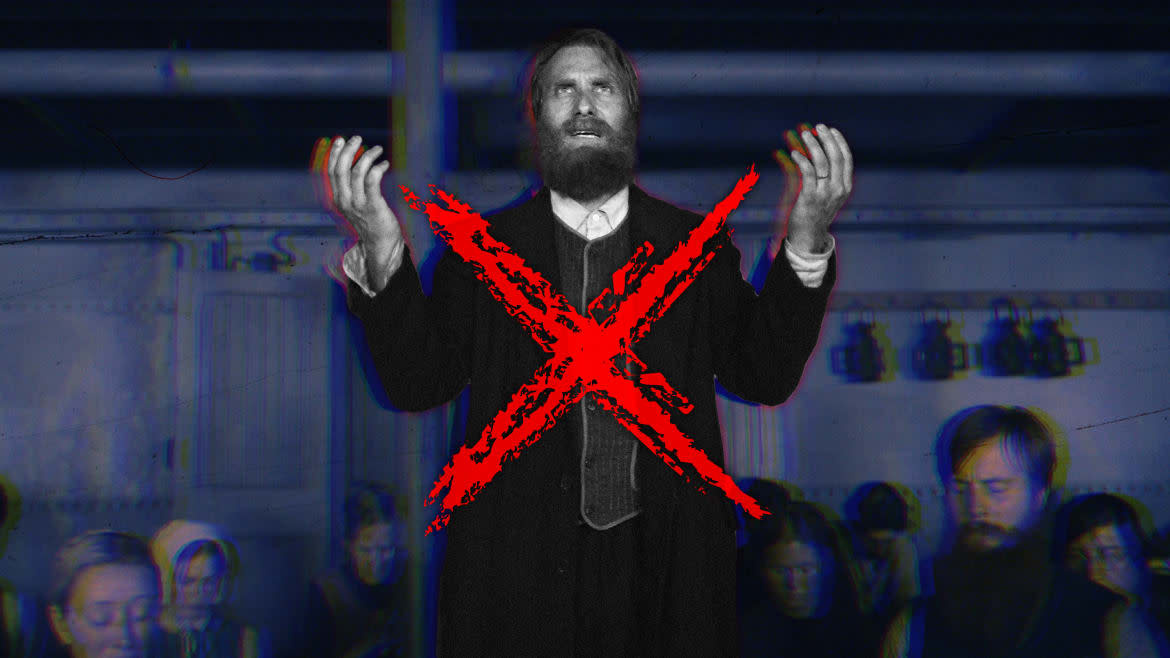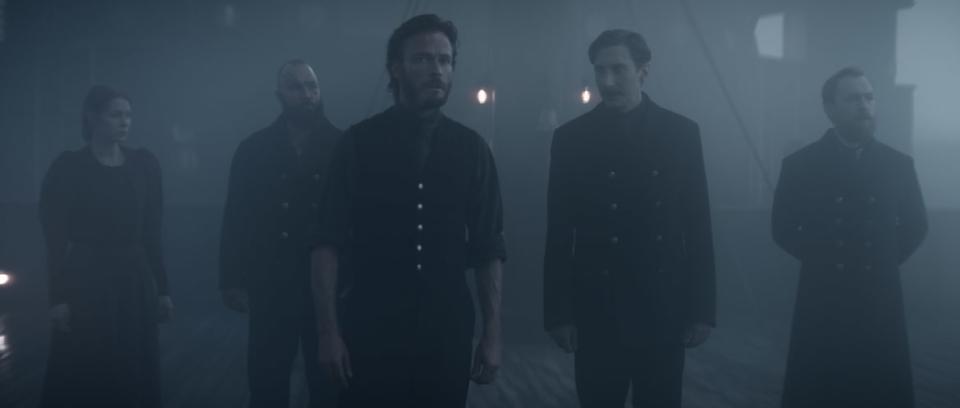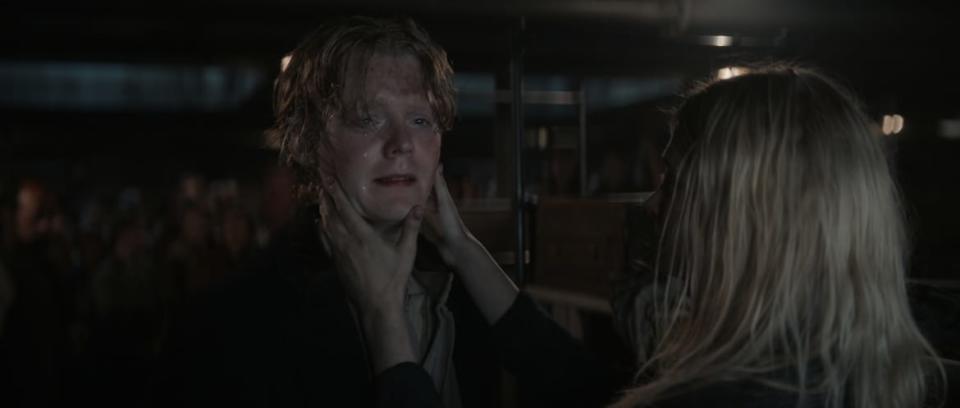Netflix Canceling Hit Show ‘1899’ Is Just Its Latest Ridiculous Decision

- Oops!Something went wrong.Please try again later.
Nothing says ushering in the new year like attempting to break old habits. Netflix obviously didn’t get the resolutions memo, not even waiting until everyone had gone back to work before swiftly canning yet another ambitious series after one season. Yep, 1899 walks the same cancellation plank as shows like Archive 81 and The Midnight Club, with the news this week that, despite its popularity, Netflix is ending the series.
Considering 1899 is the mind-bending follow-up endeavor from Dark creators Baran bo Odar and Jantje Friese, it seemed like a shoo-in for renewal. A splashy mid-November launch, sea-worthy reviews, and five weeks in Netflix’s TV Top 10—totaling 257 million cumulative hours watched during that period, according to internal metrics—suggested plain sailing ahead. If anything was going to avoid getting the chop, 1899 seemed like a solid bet.
Well, I won’t be heading to Las Vegas soon.
What begins as a voyage on a migrant vessel across the Atlantic on the cusp of the 20th century quickly descends into a twisty paranormal-infused adventure, which takes a sharp turn into reality-questioning science-fiction. What exactly is going on is unclear until the season (now series) finale and even then, the last scene raises more questions than it answers. However, the appeal of this mystery box narrative is bolstered by a strong ensemble and a multilanguage script that refuses to dumb down the dialogue.
How ‘1899’ Saved Netflix’s Very Bad Year in TV
A solemn Instagram announcement from the showrunners emphasized that they had envisioned a second and third season for the series, but “sometimes things don’t turn out the way you planned.” Regardless of network, cable, or streaming, the threat of cancellation has always existed, but the metrics behind why those decisions are made are no longer as clearly defined. Or rather, the window to finding an audience has got even smaller. Those who had already fallen hard for the passengers on this mysterious ship are undoubtedly feeling the emotional whiplash caused by the premature end of a story that is cut short for what seems to be arbitrary reasons.
Everyone has canceled-too-soon shows that evoke deep feelings of frustration coupled with sadness (my pre-streaming list includes but is not limited to, My So-Called Life, Pushing Daisies, Hannibal, The Hour, and Selfie). Yet, there is something about the frequency of Netflix’s putting titles out to pasture, coupled with the binge-watching model it birthed, that leaves a hard-to-shake awful taste.
This year marks a decade since Netflix permanently blew up the way we watched TV when House of Cards debuted in February 2013 and Orange Is the New Black followed five months later. It is now inconceivable that a scripted live-action series on this platform could match the six or seven seasons reached by those dramas. Stranger Things is a relic of a previous time, and even something like Umbrella Academy is an outlier, as it has a fourth and final season planned to wrap things up.
So, why is this a big deal? Shows have long been dumped unceremoniously throughout the history of network TV (the image of James Wolk in the very short-lived 2010 Fox drama Lone Star is burned in my brain). It is a business, after all, and only a handful of episodes have likely been shot in those cases; viewer investment isn’t as entrenched.

Flashforward (unintentional TV reference ahoy!) to the binge model and getting shit-canned after an entire season—complete with a tantalizing cliffhanger—is now the norm. Getting invested in a new series at all starts to feel rather pointless. It’s no wonder that, following the cancellation of 1899, people on Twitter are venting about how they’re so tired of getting hooked on a new Netflix series only for it to end after a season. The sentiment online is fueled by annoyance that this has happened yet again.
At the end of Archive 81, which was canceled in March after one season, we are left wondering how Dan Turner (Mamoudou Athie) will find his way back to the present day from ‘90s New York. 1899 has an equally unresolved final sequence. Now, all fans are left with is the (unlikely) hope that another platform might swoop in and save the day.
More likely, the most fans can hope for is that the show’s creators will gift them an outline of what they had planned to explore. Mike Flanagan recently shared his plans on Tumblr when The Midnight Club ended prematurely, offering closure, but with the fresh sting of what could have been. TV is visual, and words can only do so much to soften the blow.
‘1899’: Netflix’s Newest Horror Series Is a Trippy Mindf*ck
Previously, Nielsen ratings revealing audience demographics and total viewership numbers made it clear when a series was on the bubble and in danger of being canceled. There was a time when inventive fan campaigns could breathe new life into shows that were on life support. Without lightbulbs, Friday Night Lights would be on the canceled-too-soon list instead of ending after five glorious seasons. Ditto Chuck and Subway sandwiches. But even that show of fan support wouldn’t move the dial today.
It has been nearly a year since Netflix unceremoniously dumped the beloved series The Baby-Sitters Club, and I am still mad. Showrunner Rachel Shukert talked to Vulture about the information (or lack of) regarding viewing figures or what this means for a creator trying to read the Netflix tea leaves. Now, the streamer seems to have lifted the veil somewhat, revealing the Top 10 and the number of hours tallied. Although, now that we have this information, those stats make the decisions the platform is making about the future of its shows even more confusing.
In its first week, 1899 had an impressive 87 million hours watched. I mean, that sounds impressive. However, Dustin Rowles over at Pajiba has noticed a pattern, theorizing that a live-action series in its debut season needs to hit 100 million hours in its first whole week to score a renewal. It’s the magic number that was comfortably met by Wednesday and Dahmer; a handful of others (like The Watcher and The Sandman).

The message seems loud and clear: Watch a new show in its launch week, or risk being left in the dark (excuse the pun) forever. Sure, there might be other variables at play, but in the streaming era, getting attached to characters over a single season comes with a risk.
Ultimatums like this are unlikely to boost viewership going forward, and there needs to be a middle ground between immediately mainlining a season and letting an audience grow. When a new season of Stranger Things drops, there is a rush to finish it that, in part, is necessary to avoid spoilers that will no doubt flood social media and IRL conversations. This immediacy isn’t as pressing when it is a new series, as you aren’t familiar with the characters or plot, so you might not feel inclined to burn through the entire season. There is such a thing as taking your time.
“What episode are you on?” has become a standard question when discussing a streaming show with friends, because we are accustomed to being at different points and self-policing what we discuss to steer clear of spoiling. Viewing habits vary greatly, and the list of shows on at any one time is illimitable, so being able to consume 10 hours of a brand-new offering in seven days isn’t entirely realistic—and I say this as someone who writes about TV for a living.
It is why a weekly release schedule for shows like The White Lotus keeps everyone on a level playing field and encourages live viewing. Not only do weekly releases give a show time to breathe in terms of its narrative, but it also means an audience can grow over time.
What It’s Like to Have Your TV Show Unceremoniously Canceled
“But when a few weeks have passed and you haven’t watched the show yet, Netflix assumes you never will,” wrote TV critic Linda Maleh on Twitter, responding to the 1899 news. It feels counter-intuitive to give such limited wiggle room to reach an audience, particularly when TV is inherently a word-of-mouth medium. I didn’t start Dark until a short time before its third season came out, and no doubt there is a spike in viewers when multiple seasons are available. On that occasion, it was a recommendation via social media after mentioning other German shows I was fond of, like Babylon Berlin and Deutschland 83.
A series can find new viewers through positive comments, and a streamer can get stuck with a villain arc because of how it conducts its business. After this many occurrences, it is going to be hard to shake this level of cancellation notoriety. “It’s odd that Netflix hasn’t considered the consequences of having a reputation with viewers for canceling most of their shows. Viewers are going to stop bothering with Netflix shows altogether, knowing that their faves are just gonna canceled after one or two seasons anyway,” Maleh wrote.
Last month, I wrote about how 1899’s success pointed to Netflix’s strength in cultivating and producing successful international material. Its cancellation calls to mind a scene from Season 3 of Barry, which effectively skewers streamers when BanShee executive Diana Villa (Elizabeth Perkins) says, “I’ve been doing this for 30 years, and if there’s anything I’ve learned, it’s nobody knows anything except the algorithm.”
Given this pattern from Netflix, it is hardly surprising then that viewers and TV critics are beginning to question whether they should start something in the first place, when yet another ambitious series is ending without a resolution.
2022 was a year that Netflix faced backlash after backlash, and the new year is sticking to an unpopular plan.
Get the Daily Beast's biggest scoops and scandals delivered right to your inbox. Sign up now.
Stay informed and gain unlimited access to the Daily Beast's unmatched reporting. Subscribe now.

